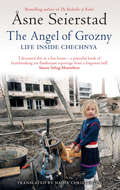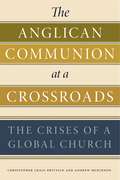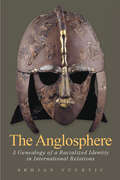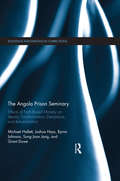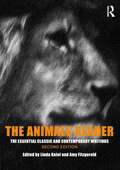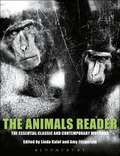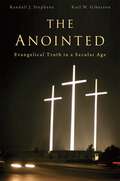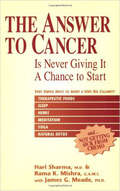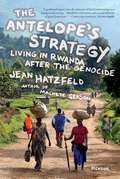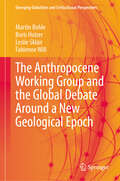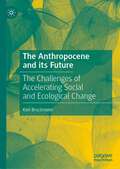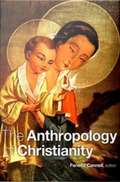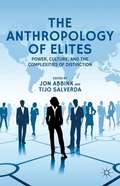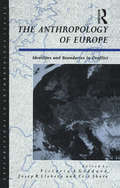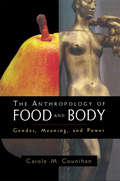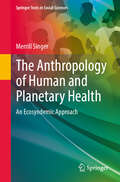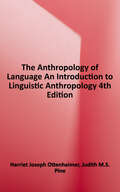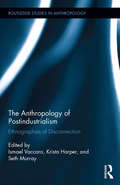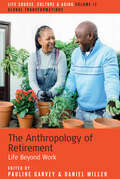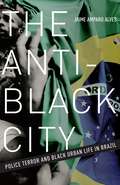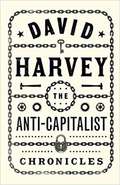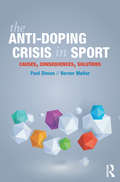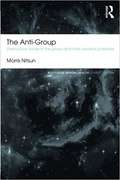- Table View
- List View
The Ancient Jewish Wedding... and the Return of Messiah for His Bride
by Jamie LashLearn about the Ancient Jewish Wedding and begin preparing for the Marriage Supper of the Lamb! The God of Abraham, Isaac, and Jacob followed the bridal customs of ancient Israel in seeking a bride for His Son, Yeshua. From the selection of the bride and the bride price, to the marriage supper, this teaching by Jamie Lash will thrill your heart and reveal God's love to you in a special way. He wants to bless you with: a Messianic Jewish perspective on "the bride", a bridal anointing, an understanding of God's plan for His people Israel, and an openness to receive gifts from your Heavenly Bridegroom.
The Angel Of Grozny: Life Inside Chechnya - from the bestselling author of The Bookseller of Kabul
by x Asne Seierstad'The best book in English about one of the world's most brutal and under-reported conflicts ... fascinating' Christina Lamb, Sunday TimesIn the early hours of New Year's Eve 1994, Russian troops invaded the Republic of Chechnya, plunging the country into a prolonged and bloody conflict. Asne Seierstad reported regularly on the war, describing its effects on those trying to live their daily lives amidst the violence. In 2006 and 2007 she returned, travelling in secret, in constant danger. The tragedy of Chechnya had continued but the world had moved on. In a broken and devastated society she meets the orphans, the wounded, the lost - and tells their stories at last.'I devoured this in a few hours - a powerful book of heartbreaking yet flamboyant reportage from a forgotten hell' SIMON SEBAG-MONTEFIORE'Invaluable ... she has a real eye for detail and the human heart of a story' OBSERVER
The Anglican Communion at a Crossroads: The Crises of a Global Church
by Christopher Craig Brittain Andrew McKinnonWorldwide debates over issues of sexuality and gender have come to a head in recent years in mainline and evangelical churches, with the Anglican Communion—a worldwide network of churches that trace their practice to Canterbury and claim some 85 million members—among the most publicly visible sites of contestation. This thorough and compelling analysis of the conflicts within the Communion argues that they are symptoms of long-simmering issues that must be addressed when Anglican bishops and archbishops meet at the 2020 Lambeth Conference.To many, the disagreements over such issues as LGBTQ clergy, same-sex marriage, and women’s ordination suggest an insurmountable crisis facing Anglicans, one that may ultimately end the Communion. Christopher Craig Brittain and Andrew McKinnon argue otherwise. Drawing on extensive empirical research and interviews with influential Anglican leaders, they show how these struggles stem from a complex interplay of factors, notably the forces and effects of globalization, new communications technology, and previous decisions made by the Communion. In clarifying both the theological arguments and social forces at play as the bishops and primates of the Anglican Communion prepare to set the Church’s course for the next decade, Brittain and McKinnon combine sociological and theological methodologies to provide both a nuanced portrait of Anglicanism in a transnational age and a primer on the issues with which the Lambeth Conference will wrestle.Insightful, informative, and thought-provoking, The Anglican Communion at a Crossroads is an invaluable resource for understanding the debates taking place in this worldwide community. Those interested in Anglicanism, sexuality and the Christian tradition, the sociology of religion, and the evolving relationship between World Christianity and churches in the Global North will find it indispensable.
The Anglosphere: A Genealogy of a Racialized Identity in International Relations
by Srdjan VuceticVucetic (public and international affairs, U. of Ottawa) tells how the US, Britain, Canada, Australia, and New Zealand form a community that exempts itself from the rules that have shaped war, peace, alliances, coalitions, and other manifestations of international conflict and cooperation in world politics. The foundation of this Anglosphere, he contends, is racial, and argues that the Special Relationship that developed at the beginning of the 20th century between a rising US and a declining Britain was based on a discourse of identity that implied natural unity and moral superiority of an Anglo-Saxon race. His evidence includes empire, Venezuela and the Great Rapprochement; ANZUS, Britain and the Pacific Pact; Suez, Vietnam and the Great and Powerful Friends; and empire, Iraq, and the Coalition of the Willing. Annotation ©2011 Book News, Inc. , Portland, OR (booknews. com)
The Angola Prison Seminary: Effects of Faith-Based Ministry on Identity Transformation, Desistance, and Rehabilitation (Innovations in Corrections #1)
by Michael Hallett Joshua Hays Byron R. Johnson Sung Joon Jang Grant DuweCorrections officials faced with rising populations and shrinking budgets have increasingly welcomed "faith-based" providers offering services at no cost to help meet the needs of inmates. Drawing from three years of on-site research, this book utilizes survey analysis along with life-history interviews of inmates and staff to explore the history, purpose, and functioning of the Inmate Minister program at Louisiana State Penitentiary (aka "Angola"), America’s largest maximum-security prison. This book takes seriously attributions from inmates that faith is helpful for "surviving prison" and explores the implications of religious programming for an American corrections system in crisis, featuring high recidivism, dehumanizing violence, and often draconian punishments. A first-of-its-kind prototype in a quickly expanding policy arena, Angola’s unique Inmate Minister program deploys trained graduates of the New Orleans Baptist Theological Seminary in bi-vocational pastoral service roles throughout the prison. Inmates lead their own congregations and serve in lay-ministry capacities in hospice, cell block visitation, delivery of familial death notifications to fellow inmates, "sidewalk counseling" and tier ministry, officiating inmate funerals, and delivering "care packages" to indigent prisoners. Life-history interviews uncover deep-level change in self-identity corresponding with a growing body of research on identity change and religiously motivated desistance. The concluding chapter addresses concerns regarding the First Amendment, the dysfunctional state of U.S. corrections, and directions for future research.
The Animals Reader: The Essential Classic And Contemporary Writings, Second Edition
by Linda Kalof Amy FitzgeraldThe Animals Reader brings together classic and contemporary writings from philosophy, ethics, sociology, cultural studies, anthropology, environmental studies, history, law and science. Providing readers with both an understanding of the multidisciplinary field of animal studies and a clear sense of how the role of animals in human society has been understood and critiqued through time, this second edition has been expanded to reflect key developments in theory and research that have emerged in recent years. Forty-two chapters are divided into six parts. Favourite entries from the first edition have been retained, and are joined by sixteen new readings covering topics such as equality, animal rights and citizenship, zoos, death and killing, and embodied communication and empathy. The second edition begins with a new prologue by acclaimed wildlife photographer and photojournalist Britta Jaschinski. Updated pedagogical features include a new general introduction by the editors, revised introductions to each part and each reading, as well as new suggestions for further reading at the end of each section. As such, The Animals Reader is an invaluable collection for students across the humanities and social sciences, and is also suitable for general readers with an interest in human-animal relations.
The Animals Reader: The Essential Classic and Contemporary Writings
by Linda Kalof Amy FitzgeraldThe study of animals - and the relationship between humans and other animals - is now one of the most fiercely debated topics in contemporary science and culture. Animals have a long history in human society, providing food, labour, sport and companionship as well as becoming objects for exhibit. More contemporary uses extend to animals as therapy and in scientific testing. As natural habitats continue to be destroyed, the rights of animals to co-exist on the planet - and their symbolic power as a connection between humans and the natural world - are ever more hotly contested. The Animals Reader brings together the key classic and contemporary writings from Philosophy, Ethics, Sociology, Cultural Studies, Anthropology, Environmental Studies, History, Law and Science. As the first book of its kind, The Animals Reader provides a framework for understanding the current state of the multidisciplinary field of animal studies. This anthology will be invaluable for students across the Humanities and Social Sciences as well as for general readers.
The Anointed: Evangelical Truth in a Secular Age
by Randall J. Stephens Karl W. GibersonAmerican evangelicalism often appears as a politically monolithic, textbook red-state fundamentalism that elected George W. Bush, opposes gay marriage, abortion, and evolution, and promotes apathy about global warming. Prominent public figures hold forth on these topics, speaking with great authority for millions of followers. Authors Stephens and Giberson, with roots in the evangelical tradition, argue that this popular impression understates the diversity within evangelicalism an often insular world where serious disagreements are invisible to secular and religiously liberal media consumers. Yet, in the face of this diversity, why do so many people follow leaders with dubious credentials when they have other options? Why do tens of millions of Americans prefer to get their science from Ken Ham, founder of the creationist Answers in Genesis, who has no scientific expertise, rather than from his fellow evangelical Francis Collins, current Director of the National Institutes of Health? Exploring intellectual authority within evangelicalism, the authors reveal how America s populist ideals, anti-intellectualism, and religious free market, along with the concept of anointing being chosen by God to speak for him like the biblical prophets established a conservative evangelical leadership isolated from the world of secular arts and sciences. Today, charismatic and media-savvy creationists, historians, psychologists, and biblical exegetes continue to receive more funding and airtime than their more qualified counterparts. Though a growing minority of evangelicals engage with contemporary scholarship, the community s authority structure still encourages the anointed to assume positions of leadership.
The Answer to Cancer
by Hari SharmaThe public hasn't had the first clue about how to prevent cancer. This book provides that clue and more. This offers effective prevention if people follow the guidelines. -Christopher S. Clark, M. D. The Raj - Maharishi Ayurveda Health CenterCharming and fun to read. It is not just a cancer book, it gives people an opportunity to learn simple, yet powerful techniques for staying fit without tough diets or impossible workout programs. -Jay Glaser, M. D. Medical Director, Lancaster Ayurveda Medical Center. Simple, natural things are the answer to cancer! Sound too easy? Here a Western research physician teams with an Eastern Ayurvedic to explain how ancient secrets -- that you can do from home! -- make it difficult for cancer to ever get started.
The Antelope's Strategy: Living In Rwanda After The Genocide
by Linda Coverdale Jean HatzfeldA powerful report on the aftereffects of the genocide in Rwanda—and on the near impossibility of reconciliation between survivors and killers In two acclaimed previous works, the noted French journalist Jean Hatzfeld offered a profound, harrowing witness to the unimaginable pain and horror in the mass killings of one group of people by another. Combining his own analysis of the events with interviews from both the Hutu killers who carried out acts of unimaginable depravity and the Tutsi survivors who somehow managed to escape, in one, based mostly on interviews with Tutsi survivors, he explored in unprecedented depth the witnesses' understanding of the psychology of evil and their courage in survival; in the second, he probed further, in talks with a group of Hutu killers about their acts of unimaginable depravity. Now, in The Antelope's Strategy, he returns to Rwanda seven years later to talk with both the Hutus and Tutsis he'd come to know—some of the killers who had been released from prison or returned from Congolese exile, and the Tutsi escapees who must now tolerate them as neighbors. How are they managing with the process of reconciliation? Do you think in their hearts it is possible? The enormously varied and always surprising answers he gets suggest that the political ramifications of the international community's efforts to insist on resolution after these murderous episodes are incalculable. This is an astonishing exploration of the pain of memory, the nature of stoic hope, and the ineradicability of grief.
The Anthropocene Working Group and the Global Debate Around a New Geological Epoch (Emerging Globalities and Civilizational Perspectives)
by Boris Holzer Martin Bohle Leslie Sklair Fabienne WillThis book examines the role of the Anthropocene Working Group (AWG) in public and scholarly discussions of the meaning of the Anthropocene proposal. The status of the Anthropocene, both as a geoscientific concept and as a cultural concept becoming increasingly familiar in the public sphere, has been highly controversial. While geoscientists focus on possible geological markers and periodisation, the social sciences, environmental humanities, and creative arts have taken up the Anthropocene as a cultural concept to make sense of the planetary environmental crisis and contemporary society. This book documents intra-, inter-, and transdisciplinary debates, particularly, although not limited to, how different scholarly disciplines have responded to the Anthropocene proposal. The authors analyse how the AWG has become the focal point of a debate that straddles the boundaries between academic disciplines and public perceptions of science. The AWG thus serves as a case of the globalisation of science in terms of the global interconnectedness of scientific disciplines and the cultural significance of the Anthropocene proposal.
The Anthropocene and its Future: The Challenges of Accelerating Social and Ecological Change
by Karl BruckmeierThis book analyses the complex social and ecological processes of the Great Acceleration, the Great Transformation, and sustainable development that shape the future of the global society in the twenty-first century. The first process takes place for a longer time, the second over the past thirty years, with attempts to build a sustainable economy and society in the global policy of sustainable development. The processes and their interaction will be discussed with knowledge from inter- and transdisciplinary transformation research, social and political ecology, and theories of modern society. The guiding theoretical concepts for the social-ecological transformation will be clarified: the concepts of acceleration, transformation, and sustainable development, and the societal and ecological processes they include. To obtain a more detailed picture of the changes in the global social-ecological system, different parts of the global transformation, the digital transformation, the transformation of food systems, and the transformation of modes of living in the social lifeworld are described to show the complex changes in the epoch of the Anthropocene more concretely. The global change processes in society and nature are caused by human forces but are difficult to control through policy and governance. With the interdisciplinary integration of concepts and knowledge, it becomes possible to provide a more detailed picture, of the difficulties to achieve a sustainable future society.
The Anthropology of Christianity
by Fenella CannellThis collection provides vivid ethnographic explorations of particular, local Christianities as they are experienced by different groups around the world. At the same time, the contributors, all anthropologists, rethink the vexed relationship between anthropology and Christianity. As Fenella Cannell contends in her powerful introduction, Christianity is the critical "repressed" of anthropology. To a great extent, anthropology first defined itself as a rational, empirically based enterprise quite different from theology. The theology it repudiated was, for the most part, Christian. Cannell asserts that anthropological theory carries within it ideas profoundly shaped by this rejection. Because of this, anthropology has been less successful in considering Christianity as an ethnographic object than it has in considering other religions. This collection is designed to advance a more subtle and less self-limiting anthropological study of Christianity. The contributors examine the contours of Christianity among diverse groups: Catholics in India, the Philippines, and Bolivia, and Seventh-Day Adventists in Madagascar; the Swedish branch of Word of Life, a charismatic church based in the United States; and Protestants in Amazonia, Melanesia, and Indonesia. Highlighting the wide variation in what it means to be Christian, the contributors reveal vastly different understandings and valuations of conversion, orthodoxy, Scripture, the inspired word, ritual, gifts, and the concept of heaven. In the process they bring to light how local Christian practices and beliefs are affected by encounters with colonialism and modernity, by the opposition between Catholicism and Protestantism, and by the proximity of other religions and belief systems. Together the contributors show that it not sufficient for anthropologists to assume that they know in advance what the Christian experience is; each local variation must be encountered on its own terms. Contributors. Cecilia Busby, Fenella Cannell, Simon Coleman, Peter Gow, Olivia Harris, Webb Keane, Eva Keller, David Mosse, Danilyn Rutherford, Christina Toren, Harvey Whitehouse
The Anthropology of Elites: Power, Culture, And The Complexities Of Distinction (New Directions In Anthropology Ser. #37)
by Jon Abbink Tijo SalverdaOffering insightful anthropological-historical contributions to the understanding of elites worldwide, this book helps us grasp their ways of life and role in times of contested global inequalities. Case studies include the Polish gentry, the white former colonial elite of Mauritius, professional elites, and transnational (financial) elites.
The Anthropology of Europe: Identities and Boundaries in Conflict (Explorations In Anthropology Ser.)
by Victoria A. GoddardThis is the first study of Europe post-1989 from an anthropological perspective. Thirteen distinguished authors examine the social, cultural and political implications of European integration with particular emphasis on changing European identities, concepts of citizenship and levels of participation. Their aim is to suggest an agenda for future research capable of addressing developing trends in contemporary Europe. The book is divided into two parts. The first deals with major theoretical issues that have characterized the anthropological study of Europe and includes a detailed introductory chapter which charts the history of anthropology in Europe and considers the prospects for an anthropology of Europe. This is followed by key themes in the study of European society and culture including kinship, gender, nationalism, immigration and changing patterns of production. The second section develops these themes further using different theoretical perspectives to explain complex issues such as nationalism, ethnic identities, and sectarian conflicts. Nine case studies cover a wide range of contemporary topics including European integration and Irish nationalism, the transmission of ethnic identity, and identity and conflict in the former Yugoslavia and post-colonial Gibraltar. This book fills a gap in the literature on European integration and will be of interest to anthropologists and sociologists as well as students of Political Science, Communications and European Studies.
The Anthropology of Food and Body: Gender, Meaning and Power
by Carole M. CounihanThe Anthropology of Food and Body explores the way that making, eating, and thinking about food reveal culturally determined gender-power relations in diverse societies. This book brings feminist and anthropological theories to bear on these provocative issues and will interest anyone investigating the relationship between food, the body, and cultural notions of gender.
The Anthropology of Human and Planetary Health: An Ecosyndemic Approach (Springer Texts in Social Sciences)
by Merrill SingerThis text introduces undergraduate and graduate students in health or environment-related classes to the mounting crisis of syndemics through the lens of planetary health. The concept of syndemics, developed by the author and now in wide use across multiple health-related disciplines, focuses attention on the adverse synergistic interaction of two or more diseases or other health conditions promoted or facilitated by social and/or environmental conditions. The planetary health framework is an emerging holistic medical rethinking of our understanding of health. It seeks to identify the safe environmental limits within which humanity and other species can flourish on our increasingly imperiled planet. This book offers useful conceptual tools and frameworks for developing a comprehensive understanding of approaches needed to address the health risks of our changing world. The unique coverage of this book is its careful examination of ecosyndemics around the world in light of the growing recognition that on a heavily disrupted planet, a narrow focus on human health is inadequate. Under these circumstances, a comprehensive planetary health framework is needed. This approach seriously considers the interconnected nature of human health, animal and plant health, and the health of the world’s ecosystems. Highly descriptive, with numerous cases of the planetary health crisis, the textbook is written in a student-friendly and accessible way and is an important resource for coursework across environment and health-related subjects.
The Anthropology of Language: An Introduction to Linguistic Anthropology
by Harriet Joseph Ottenheimer Judith M. S. PineLearn the methodology, skills, techniques, tools, and applications of Linguistic Anthropology with The Anthropology of Language: An Introduction to Linguistic Anthropology. This highly readable introductory text emphasizes the kinds of intriguing questions that anthropologists ask about language. The fourth edition brings together the key areas of linguistic anthropology, addressing issues of power, race, gender and class throughout. "In the Field" vignettes draw you into the chapter material and are culled from authors Ottenheimer and Pine's own experiences, among others. Other features--"Doing Linguistic Anthropology" and "Cross-Language iscommunication"--describe some of the real-life applications of concepts discussed in the text, helping you cement your understanding of the concepts and their relevance.
The Anthropology of Postindustrialism: Ethnographies of Disconnection (Routledge Studies in Anthropology)
by Ismael Vaccaro Krista Harper Seth MurrayThis volume explores how mechanisms of postindustrial capitalism affect places and people in peripheral regions and de-industrializing cities. While studies of globalization tend to emphasize localities newly connected to global systems, this collection, in contrast, analyzes the disconnection of communities away from the market, presenting a range of ethnographic case studies that scrutinize the framework of this transformative process, analyzing new social formations that are emerging in the voids left behind by the de-industrialization, and introducing a discussion on the potential impacts of the current economic and ecological crises on the hyper-mobile model that has characterized this recent phase of global capitalism and spatially uneven development.
The Anthropology of Retirement: Life Beyond Work (Life Course, Culture and Aging: Global Transformations)
by Daniel Miller Pauline GarveyAs a result of growing life expectancy, the period of retirement is likely to surpass the entire period of working life in many countries. There is little acknowledgement that retirement is not an event but an extended period of life that unfolds over several decades. Experiences vary considerably across the globe, from areas where most people cannot afford to retire to places where a multitude of new possibilities are being developed for retirees. This book is an anthropological approach to consider life beyond retirement in a wide range of contexts and consequences.
The Anti-Black City: Police Terror and Black Urban Life in Brazil
by Jaime Amparo AlvesAn important new ethnographic study of São Paulo&’s favelas revealing the widespread use of race-based police repression in Brazil While Black Lives Matter still resonates in the United States, the movement has also become a potent rallying call worldwide, with harsh police tactics and repressive state policies often breaking racial lines. In The Anti-Black City, Jaime Amparo Alves delves into the dynamics of racial violence in Brazil, where poverty, unemployment, residential segregation, and a biased criminal justice system create urban conditions of racial precarity. The Anti-Black City provocatively offers race as a vital new lens through which to view violence and marginalization in the supposedly &“raceless&” São Paulo. Ironically, in a context in which racial ambiguity makes it difficult to identify who is black and who is white, racialized access to opportunities and violent police tactics establish hard racial boundaries through subjugation and death. Drawing on two years of ethnographic research in prisons and neighborhoods on the periphery of this mega-city, Alves documents the brutality of police tactics and the complexity of responses deployed by black residents, including self-help initiatives, public campaigns against police violence, ruthless gangs, and self-policing of communities.The Anti-Black City reveals the violent and racist ideologies that underlie state fantasies of order and urban peace in modern Brazil. Illustrating how &“governing through death&” has become the dominant means for managing and controlling ethnic populations in the neoliberal state, Alves shows that these tactics only lead to more marginalization, criminality, and violence. Ultimately, Alves&’s work points to a need for a new approach to an intractable problem: how to govern populations and territories historically seen as &“ungovernable.&”
The Anti-Capitalist Chronicles
by David HarveyAmidst waves of economic crises, health crises, class struggle and neo-fascist reaction, few possess the clarity and foresight of world-renowned theorist, David Harvey. Since the publication of his bestselling A Brief History of Neoliberalism, Harvey has been tracking the evolution of the capitalist system as well as tides of radical opposition rising against it. In The Anti-Capitalist Chronicles, Harvey introduces new ways of understanding the crisis of global capitalism and the struggles for a better world. While accounting for violence and disaster, Harvey also chronicles hope and possibility. By way of conversations about neoliberalism, capitalism, globalization, the environment, technology, social movements and crises like COVID-19, he outlines, with characteristic brilliance, how socialist alternatives are being imagined under very difficult circumstances. In understanding the economic, political and social dimensions of the crisis, Harvey’s analysis in The Anti-Capitalist Chronicles will be of strategic importance to anyone wanting to both understand and change the world.
The Anti-Doping Crisis in Sport: Causes, Consequences, Solutions
by Paul Dimeo Verner MøllerThe sense of crisis that pervades global sport suggests that the war on doping is still very far from being won. In this critical and provocative study of anti-doping regimes in global sport, Paul Dimeo and Verner Møller argue that the current system is at a critical historical juncture. Reviewing the recent history of anti-doping, this book highlights serious problems in the approach developed and implemented by the World Anti-Doping Agency (WADA), including continued failure to accept responsibility for the ineffectiveness of the testing system, the growing number of dubious convictions, and damaging human-rights issues. Without a total rethink of how we deal with this critical issue in world sport, this book warns that we could be facing the collapse of anti-doping, both as a policy and as an ideology. The Anti-Doping Crisis in Sport: Causes, Consequences, Solutions is important reading for all students and scholars of sport studies, as well as researchers, coaches, doctors and policymakers interested in the politics and ethics of drug use in sport. It examines the reasons for the crisis, the consequences of policy strategies, and it explores potential solutions.
The Anti-Group: Destructive Forces in the Group and Their Creative Potential (Routledge Mental Health Classic Editions)
by Morris NitsunThe 'anti-group' is a major conceptual addition to the theory and practice of group psychotherapy. It comprises the negative, disruptive elements, which threaten to undermine and even destroy the group, but when contained, have the potential to mobilise the group's creative processes. Understanding the 'anti-group' gives therapists new perspectives on the nature of relationships and alternative strategies for managing destructive behaviour.
The Anti-Oligarchy Constitution: Reconstructing the Economic Foundations of American Democracy
by William E. Forbath Joseph FishkinA bold call to reclaim an American tradition that argues the Constitution imposes a duty on government to fight oligarchy and ensure broadly shared wealth. Oligarchy is a threat to the American republic. When too much economic and political power is concentrated in too few hands, we risk losing the “republican form of government” the Constitution requires. Today, courts enforce the Constitution as if it has almost nothing to say about this threat. But as Joseph Fishkin and William Forbath show in this revolutionary retelling of constitutional history, a commitment to prevent oligarchy once stood at the center of a robust tradition in American political and constitutional thought. Fishkin and Forbath demonstrate that reformers, legislators, and even judges working in this “democracy of opportunity” tradition understood that the Constitution imposes a duty on legislatures to thwart oligarchy and promote a broad distribution of wealth and political power. These ideas led Jacksonians to fight special economic privileges for the few, Populists to try to break up monopoly power, and Progressives to fight for the constitutional right to form a union. During Reconstruction, Radical Republicans argued in this tradition that racial equality required breaking up the oligarchy of slave power and distributing wealth and opportunity to former slaves and their descendants. President Franklin Roosevelt and the New Dealers built their politics around this tradition, winning the fight against the “economic royalists” and “industrial despots.” But today, as we enter a new Gilded Age, this tradition in progressive American economic and political thought lies dormant. The Anti-Oligarchy Constitution begins the work of recovering it and exploring its profound implications for our deeply unequal society and badly damaged democracy.

